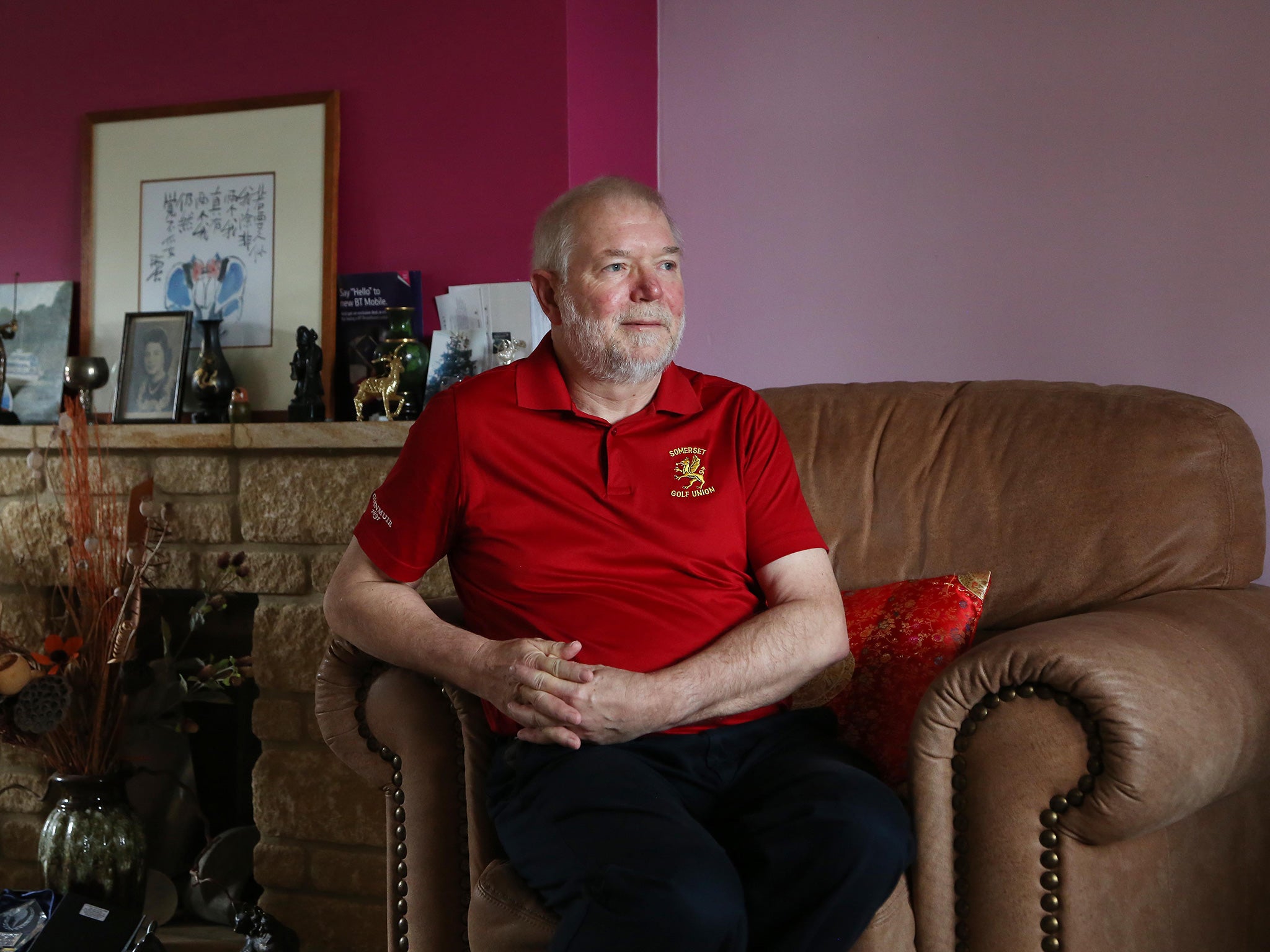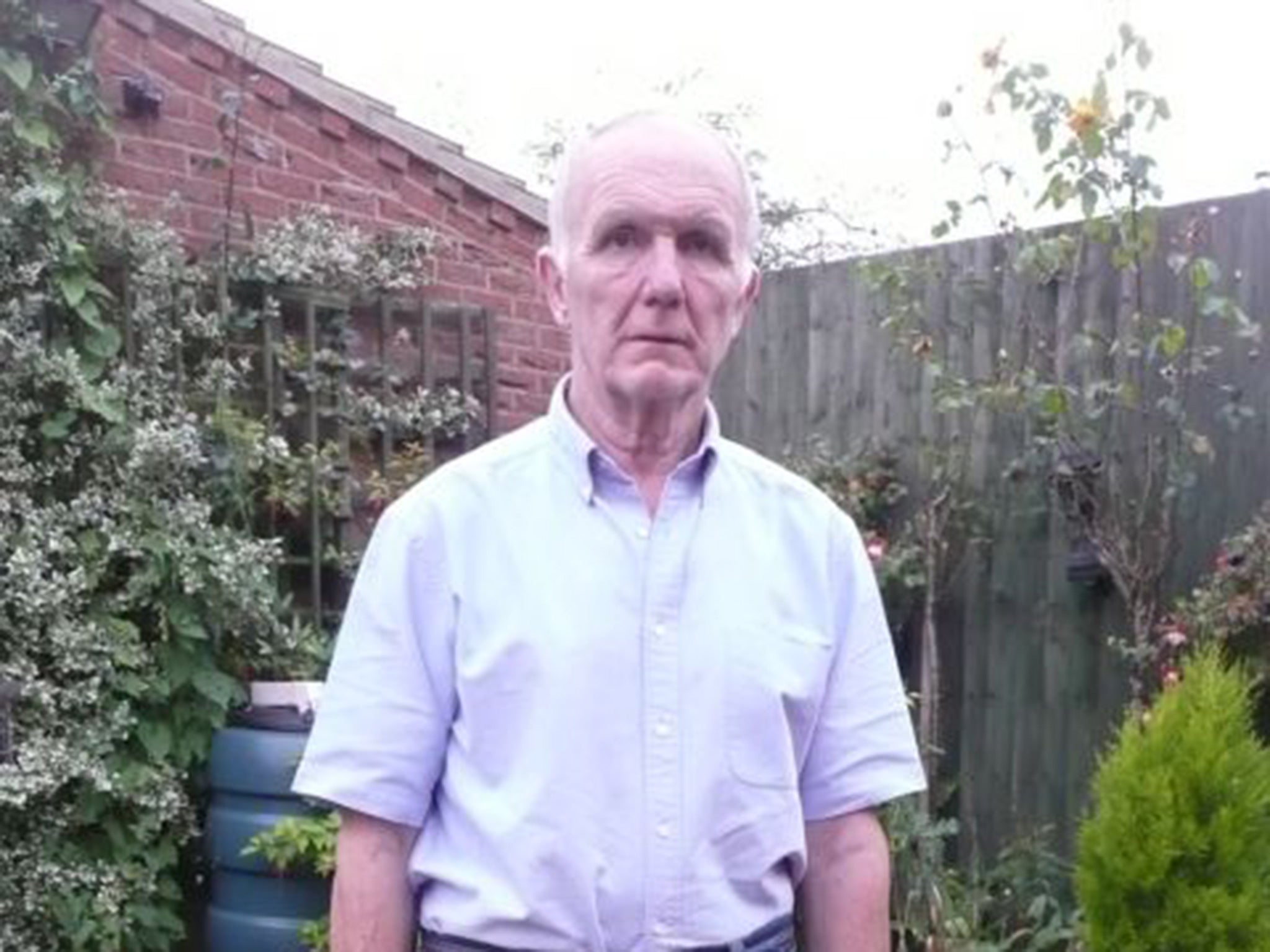Abestos: Government urged to give fair compensation to ex-servicemen suffering from mesothelioma
Senior military figures urge Government to give fair compensation to ex-servicemen suffering from mesothelioma

Your support helps us to tell the story
From reproductive rights to climate change to Big Tech, The Independent is on the ground when the story is developing. Whether it's investigating the financials of Elon Musk's pro-Trump PAC or producing our latest documentary, 'The A Word', which shines a light on the American women fighting for reproductive rights, we know how important it is to parse out the facts from the messaging.
At such a critical moment in US history, we need reporters on the ground. Your donation allows us to keep sending journalists to speak to both sides of the story.
The Independent is trusted by Americans across the entire political spectrum. And unlike many other quality news outlets, we choose not to lock Americans out of our reporting and analysis with paywalls. We believe quality journalism should be available to everyone, paid for by those who can afford it.
Your support makes all the difference.Senior military figures, armed forces charities and politicians have condemned the Government for its unfair treatment of veterans who will die from cancer caused by asbestos exposure during their time in service.
They are demanding that veterans get the same compensation as civilians, and accuse the Government of breaching the Armed Forces Covenant, which is supposed to prevent people being disadvantaged because of their service in the military.
The scandal of thousands of ex-service personnel being denied the six-figure lump sums given to civilians with the same illness was first revealed by The Independent last week.
Under a loophole in the law, those suffering illness or injury caused before 1987 cannot sue the Ministry of Defence (MoD).
A non-married veteran suffering with cancer caused by asbestos would be entitled only to receive a war disablement pension amounting to around £31,000 over the course of a year.

Yet under the 2014 Mesothelioma Act, a 63-year-old civilian in the same situation with the same condition could expect a £180,000 lump sum. About 2,500 Royal Navy veterans will die of mesothelioma by 2050. The disease, which takes decades to become apparent, usually results in death within a year or so of diagnosis.
“The current approach by this Government for compensating veterans who develop this particularly aggressive terminal cancer must be changed because it’s a clear breach of the Armed Forces Covenant,” said Chris Simpkins, director general of the Royal British Legion, yesterday.
“It simply can’t be right that some veterans suffering from cancer as a result of being exposed to asbestos while serving could end up receiving around £150,000 less in compensation than their civilian counterparts,” he added.
Madeleine Moon MP, a member of the Commons Defence Select Committee, accused the MoD of “exploiting a legal technicality to avoid paying fair and proportionate compensation” to service personnel exposed to asbestos.
And Admiral Lord West, former First Sea Lord and Chief of Naval Staff, commented: “The Government must show they are taking the Armed Forces Covenant seriously by rectifying the gross inequality of compensation for service personnel suffering from this dreadful killer disease vis-à-vis their civilian counterparts.”
General Lord Richards, former Chief of Defence Staff, remarked: “Issues like this lie at the heart of the Armed Forces Covenant. I am confident the Prime Minister and Defence Secretary will ensure the MoD does the right thing, and ensure all veterans are treated fairly.”
In a statement, an MoD spokesperson said: “We are currently considering whether a lump sum can be provided for future mesothelioma claimants. The Government places great importance on the health and wellbeing of our veterans and we are absolutely committed to treating them fairly.”
Three veterans – two who cannot claim compensation and one who was able to – tell their stories.
Rhod Palmer

Rhod Palmer, 62, spent most of his working life as an air engineering officer in the Royal Navy, serving on ships such as the HMS Ark Royal and HMS Intrepid. He rose to the rank of commodore and retired in 2006 after 34 years of service. Mr Palmer lives in Bruton, Somerset, and is married with two children, a stepson and a one- year-old grandson. He was diagnosed with mesothelioma in April 2015 and told he would die within months.
“My family comes from Plymouth and my father and both grandfathers served in the Royal Navy. I joined as a university cadet at the end of my first year at Imperial College London, where I was doing a mechanical engineering degree.
“I’ve been healthy and fit as a fiddle and represented the Navy at badminton into my 40s. I was getting more and more tired but just thought I was getting old. When I was diagnosed, because mesothelioma is said to be ‘asbestos-related’ and ‘work-related’, I started to think about my years training in the Royal Navy on the old warships which were just full of the stuff.
“We did all sorts of jobs. A week’s worth of engine room watch-keeping, or working on boiler room watch… in an atmosphere which had asbestos. I remember once working with the electric department trying to track down a wiring fault when I was literally on my hands and knees breathing in who knows what on the floor.
“I did my research and looked into claiming my war pension from the MoD. They have given me a 100 per cent war disablement pension. They asked me for information and it took me a good month to put it together. It took from last May to September to get it sorted out. It just doesn’t seem fair that civilians can claim more. If the Government has a military covenant, they need to stick to it. Ultimately they need to practise what they preach. One should be given the same deal as what civilians are offered.
“I feel let down but not surprised. You’ve got a lot of quite young mandarins who see claims as an intellectual challenge to come up with a legal counter, rather than trying to come to something which provides a decent sense of justice. I’m an ex-commodore so I was quite close to a lot of these people, so one naturally becomes a bit cynical.
“I’ve had six sessions of chemotherapy which is more than most, probably because I’m relatively young and fit. There has been shrinkage of the tumour but then you ask, ‘what’s the prognosis now?’ and they’ll still come up with ‘well it’s months and not years’. I’ve passed my first expiry date – they said four to six months and that was in April – so I’m doing very well.
“It’s all totally surreal.I was looking forward to a life expectancy of 90 because I only buried my father a couple of years ago.
“I suppose one of the hardest things is losing about a third of your life, that’s quite hard. And it’s all the things like my young grandchild won’t remember me, and the effect on the family. It pisses you off when you hear every two minutes on the TV that everybody’s living longer.
“The Government boasts about the armed forces covenant but will they put their money where their mouth is? Not at all. If you’ve been told you’ve got months to live what’s going to do you more good? A huge claiming system or a lump sum of money which you can sensibly do with whatever you want and best help your family as you see fit?
“Personally my finances are not bad, as an ex-commodore I’ve got a good pension. However you can also argue that I have lot to lose and my family has got a lot to lose by me dying before I’m due.
“What angers me is losing potentially a third of my life – that is a pretty big thing. I worked my balls off over all those years, and you are treated with disdain by the Government.
“I’ve had great support from my wife, family and friends, and I’ve been fortunate that the chemotherapy has been as successful as can be hoped for. But it just delays things a little. It’s a reprieve – no remission. The bottom line is that I need to consider my family now and their future without me.”
Fred Minall

Fred Minall, 74, was a mechanical engineer in the Royal Navy for almost a decade before joining the police and reaching the rank of inspector. The veteran, who is married with three sons and six grandsons and lives in Northampton, was recently diagnosed with mesothelioma and has applied for a war disablement pension.
“I left school at 15 and joined the Royal Navy. Between 1957 and 1965 I served as a mechanical engineer. I was in the Mediterranean, the Middle East and spent a lot of time in the northern hemisphere, up by Norway, Iceland and Greenland. The nearest I got to active service was Cyprus. Suez had just finished when I joined.
“I served on four destroyers. All were steam propelled and the pipes were covered with asbestos insulating material. Before we could touch any piece of machinery this insulating material had to be broken away and re-covered with asbestos, which was in large bags. We picked it out with our hands and arms and would get it all over our overalls and bodies. We weren’t told of the dangers, we had no protective clothing or face masks or anything.
“I’ve been ill since January this year. I suddenly lost all my energy and in a matter of weeks I dropped from being able to swim 40 lengths down to no lengths. But it wasn’t until August that the doctor diagnosed mesothelioma.
“I feel ill, constantly exhausted. I’ve lost all incentive to do things, I no longer garden, I no longer do my woodwork, and I’m unable to swim. I went for a walk with my wife the other day for about 40 minutes and I’m still recovering from it.
“It is treatable but incurable. My consultant is considering what, if any, treatment they are going to offer me. I was advised I should seek compensation by one of the medical staff. But I discovered that because I served between 1957 and 1965 I cannot claim compensation from the MoD.
“I was very, very shocked about this and feel it’s unfair, it’s unjust. There must be literally hundreds if not thousands of people in my situation that are simply being pushed aside in terms of compensation. The law ought to be changed because we are being discriminated against, which in this day and age is unacceptable.
“I’m not the type of person to sit back and allow injustices to continue so I have written to the Second Sea Lord, because he’s in charge of personnel, to see if he is aware of the situation. I’ve also contacted and spoken with my local MP, David Mackintosh, who is also shocked by this.
“The MoD is willing to pay out after 1987 and it makes me realise there are a large number of people being disadvantaged, which I think in today’s society is a sad state of affairs. When you consider there is an Armed Forces Covenant which says we will treat all serving or ex-personnel as equal to civilians, it makes you wonder where they are coming from.”
Colin Thorne

Colin Thorne, 60, who served as a petty officer and a marine engineering mechanic in the Royal Navy between 1971 and 1995, learnt he had mesothelioma in December 2013. Married with three children and four grandchildren, he lives in Gateshead. He had to fight for almost a year to get compensation, and the MoD awarded him an undisclosed settlement in March. He was able to claim because his exposure to asbestos went beyond the 1987 cut-off date which prevents thousands who were exposed decades ago from seeking any compensation beyond a war pension.
“I’d been suffering with shortness of breath for a while and thought it was just an age thing, but I went to the doctors and it all snowballed from there. The mesothelioma diagnosis I received completely knocked me and my wife for six, particularly as it has been caused simply by going to work and doing my job.
“I was an engineer and to get to mechanical defects you had to rip the lagging off the pipes or around the valves while you were at sea.
“While I was going through my chemotherapy last year was probably the worst time. It was physically and mentally draining because at the same time I was dealing with the war pensions people. Everything I was reading online was saying that because of what I had, the Government would treat it as a high-priority case.
“I eventually got the war pension but it was a bit of a farce. It took four to six months. They’ve got a charter that says claims will be dealt with within 90 days but after the 90 days I phoned them and they’d lost my service records.
“This went on for weeks. I got my solicitor involved and two days later I had a letter saying I would be getting the pension. It was pretty tough financially to start with, but when I got the war pension it made things a lot easier.
“It makes me angry that I had to fight for nearly a year to get compensation; there was no apology and that hurts a lot because I served for 24 years in the Navy. I feel let down.
“If I got paid then Joe Bloggs from the 1970s should be getting paid as well. It should be a level playing field – if one gets paid, everybody should. It’s unfair for people who were exposed to asbestos before 1987. My heart goes out to them, it really does.
“I have no long-term plans. My doctor has said I’ve gone past what she deemed as a prognosis, so let’s hope everything stays stable for a long time.”
Join our commenting forum
Join thought-provoking conversations, follow other Independent readers and see their replies
Comments